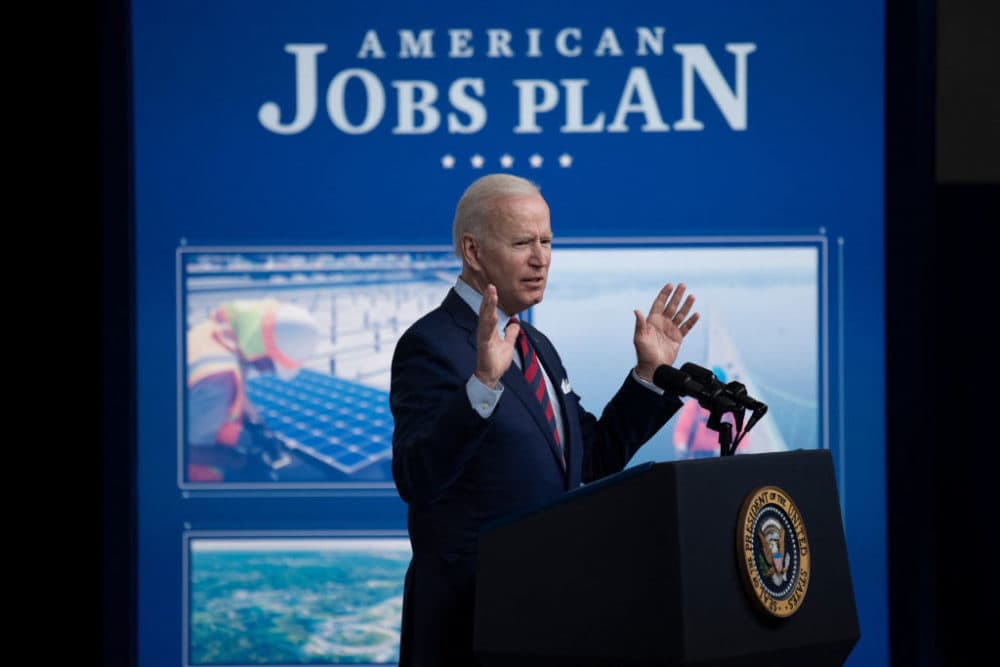Advertisement
Commentary
Don't Get Caught Up In 'Infrastructure' Semantics: Biden's Plans Are Essential Investments

Infrastructure: Noun. “The basic physical and organizational structures and facilities (e.g. buildings, roads, power supplies) needed for the operation of a society or enterprise.”
President Joe Biden accentuated the “organizational” elements of infrastructure in his address to Congress Wednesday night, even as Republicans fixated on the “physical,” claiming that the president’s American Jobs Plan defines every human activity except dog-walking as “infrastructure.”
Besides traditional public works — earthbound (the interstate highways) and even extraterrestrial ("scientific breakthroughs [that] took us to the Moon and now to Mars") — Biden talked up human infrastructure: "Eight hundred thousand families are on a Medicaid waiting list right now to get home care for their aging parent or loved one with a disability. This plan will help those families and create jobs for our caregivers with better wages and better benefits."
But the speech hadn’t even been copy-edited when Senate Minority Leader Mitch McConnell lunged last week: "They've assembled a patchwork of left-wing social engineering programs and want to label it infrastructure.”
McConnell and Republicans target provisions like the $400 billion proposed for elder and disabilities care and $5 billion for violence prevention. To be sure, the plan also proposes lots of green — I don’t just mean eco-friendly — for physical infrastructure: $115 billion for roads and bridges, $80 billion for rail, $100 billion on the power grid and energy, $125 billion for deteriorating schools and childcare facilities.
How should those who are neither utopians, democratic socialists nor fascists Trump voters — the coveted-by-politicians one-third of the country that calls itself “moderates” — parse this debate?
Congressional moderates should see Biden’s physical-infrastructure ante and raise it, suggesting “organizational” alternatives to the president’s
First, recall that the definition of “infrastructure” has always evolved with technology. Caesar Augustus constructed public works, but he couldn’t build a railroad like Lincoln, who couldn’t expand the electric grid like FDR, who couldn’t thread the country with broadband, as Biden proposes to catch students and workers stranded in the digital divide.
Moderates should also note Republican double-talk. McConnell once hailed broadband investments — in the 2018 farm bill. Perhaps having a Republican president to claim credit expanded the Kentuckian’s definition of “working the land”?
McConnell wasn’t exceptionally imaginative in lumping together “organizational” and “physical” infrastructure. In 1943, Congress used the Defense Public Works Law to authorize funding of childcare for mothers working the factories, while men fought World War II. Just last year, Donald Trump’s Cybersecurity and Infrastructure Security Agency deemed “essential critical infrastructure workers” to include home health care workers and “home-maker services for frail, homebound, older adults.” The worst sin Republicans can pin on Biden is plagiarism.
Advertisement
The GOP’s $568 billion, concrete-steel-and-rails-only counter-offer is, to use a technical term, a con, stitched mostly from projects the government was going to do anyway.

Congressional moderates should see Biden’s physical-infrastructure ante and raise it, suggesting “organizational” alternatives to the president’s -- premised on even more emergent needs. Some needn’t require tax increases, neutering another Republican objection to Biden’s proposal.
History suggests a roadmap drafted by an unapologetic conservative: Otto von Bismarck, the anti-socialist German chancellor who pioneered the welfare state in the 1880s. “The real grievance of the worker,” Bismarck noted, “is the insecurity of his existence. He is not sure that he will always have work, he is not sure that he will always be healthy, and he foresees that he will one day be old and unfit to work.”
The infrastructure bill obviously provides work; what if it also shored up Social Security’s solvency to guarantee workers comfort when they’re old? As for health, that starts with putting food on the table. A reboot of Lincoln’s Homestead Act, with federal support for healthy-food farms and farmers’ markets, can be had by cutting Big Ag’s corporate welfare.
House Speaker Nancy Pelosi is displeased with Biden’s foot-dragging over broader health care improvements. Maybe Biden aspires to challenge Elizabeth Warren’s world record for number of plans released, by offering future health legislation. But health reforms — which would particularly redress disparities for Black workers -- are at least as worthy for inclusion in the infrastructure act as his chosen priorities.
There are two more needs. Biden's American Families Plan, detailed in his speech, called for free tuition at community colleges, which do essential workforce training and are in financial crisis from the pandemic. Up to a quarter of infrastructure jobs could require various levels of college education. Biden should fast-track free tuition at public two-year colleges; he should also throw in free tuition at four-year public institutions, rerouting existing higher-ed spending to get the job done. (The president, unimaginatively and reactionarily, would merely fatten those existing programs.)
Finally, Biden commendably wants to make childcare affordable for the poor. Mitt Romney supports permanent childcare grants, again paid for with current spending. Biden should negotiate with him to fold those into the infrastructure bill, an obvious complement to its rehab of childcare facilities.
If moderates are still hung up over the semantics of “infrastructure,” they should try this thought experiment: Do you agree with Biden’s soft priorities (or mine) in principle, such that you’d support them if they were in separate legislation? If so, then, as wise people counsel, who cares whether it’s called the American Jobs Act or the Grow More Bananas Act? They’re still necessary government investments.
The president’s plan isn’t perfect, but it addresses real “organizational” and “physical” infrastructure needs. Moderates in Congress should try to improve it.
